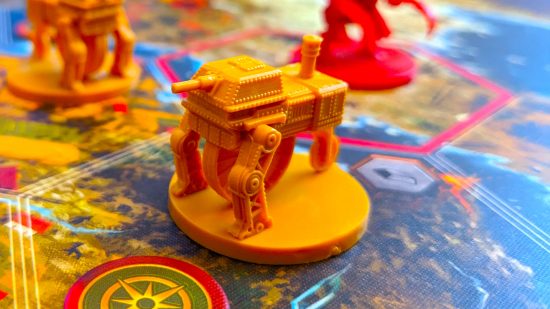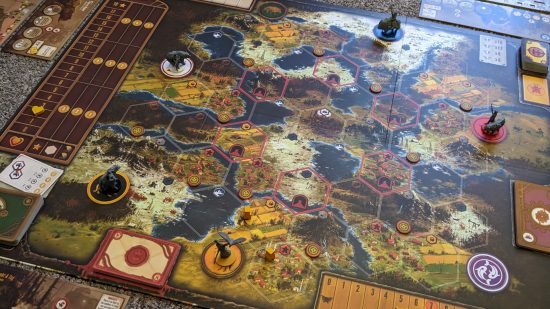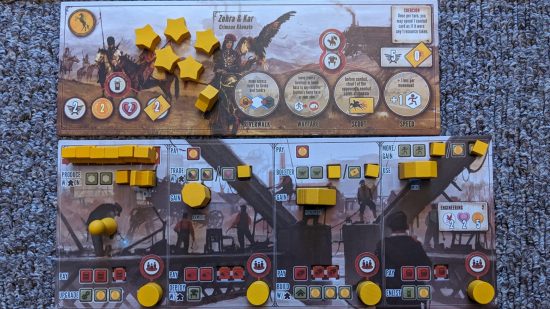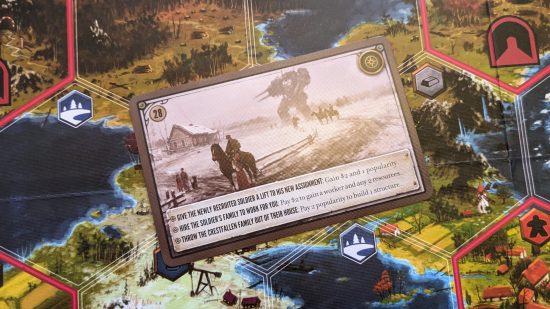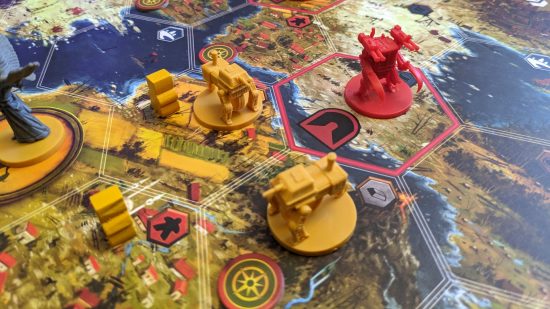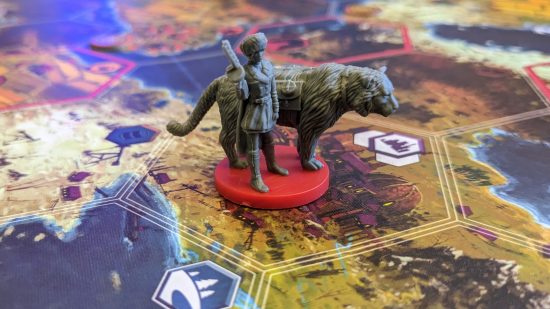Our Verdict
Gorgeous, grand, and a little grating, this slow-paced strategy game inspires extreme emotions - extreme excitement when a flawless plan pays off, and extreme frustration when the turns begin to drag. The overall experience ends up somewhere in the middle, creating an enjoyable game, albeit one I wouldn't bring to the table all that often.
- Magnificent visuals
- Brilliant, compelling theme
- Complex engine building shines at times
- Slow pace for most of the game
- Scoring can get confusing
- Unintuitive for new players
Earning nearly $2 million in its 2015 Kickstarter, Stonemaier’s Scythe board game is a well-known crowdfunding success story. It’s hailed by many as a classic of modern board games. However, as a newcomer to the title (with a copy generously provided by the publisher), I’m not sure that Scythe quite lives up to the hype.
Before we start the engine on this Scythe review, a bit of housekeeping. While I’ve played solo and with expansions, the majority of my time with the strategy board game was spent testing good-old-fashioned base game multiplayer, so the review predominantly focuses on this.
So what is Scythe, anyway?
It’s the 1920s in Eastern Europe, but not as you know it. Enormous mechs flatten grassland, sending farmers scurrying to safety. Ambitious oligarchs mine the woodlands and tundras for their natural resources, bolster their recruits, and set out to conquer the landscape. But politics is about far more than firepower – you’ll need to be resourceful, popular, and powerful for your faction to get ahead.
That theme provides the backdrop for Scythe, and it blends elegantly with the mechanics of the strategy board game. Scythe is mainly a game of resource management, with a little area control thrown in as spice. And boy, are there a lot of plates to spin.
The first resource you’ll need to consider is stars (or achievements). There are ten ways to earn stars, which range from building structures to recruiting enough workers, from completing secret objectives to winning mech-on-mech combat. Once someone earns their sixth star, the game’s end-state triggers.
Scythe has a rather complex scoring system, so we’ll come back to how you actually win in a moment. For now, let’s talk about how to earn stars – get ready to spin those plates.
Every player has their own personal faction (complete with unique special ability) and a randomized player board with four sections. Each turn, you’ll choose one section to perform the action at the top. You can also perform the bottom action if you’ve got the resources to pay for it.
Top actions include moving around the board, paying gold to gain resources, using workers to produce resources on your land, boosting your popularity, or upping your combat power. Bottom actions let you build mechs and structures, or upgrade your player board so it yields more rewards for a reduced cost.
You can even add an entirely new set of actions to your player board if you make it to the Factory square at the center of the main map. Crucially, once you’ve used one section of your board, you’ll need to choose another before you can use it again – no spamming the move action, folks.
Many of these actions earn stars if you perform them enough times, and you’ll need to juggle several projects if you want to earn all six achievements. There’s no need to do everything though, and sometimes choosing a part to let slip lets you earn stars in other areas much faster.
More resources means more possible strategies to clinch a win. Combine this with five different factions to play and randomized player boards, and you’ve got a rich board game with huge amounts of replay value. You’ve also got one that can be seriously overwhelming for new players.
Scythe rewards careful planning, but it’s not immediately obvious how everything interacts unless you’re well-versed with some of the other best board games in this genre. Just a few wrong moves could leave you falling behind stronger factions. And the complexity of the scoring often means players have no clue whether they’re making good choices during play.
End-game scoring gives you coins for every star you earn, every square of territory you control, and every two resources you own. Your popularity score multiplies these numbers. Then you gain coins based on where you built your structures, and the person with the most coins wins.
After a few games of Scythe, you’ll gradually wrap your head around the rules. After that, it opens up like a puzzle box, and you can fully appreciate the engine powering this vast machine. It’s a clever design with some satisfying crunch, but not everything runs smoothly.
The pacing of Scythe is its best friend as well as its worst enemy. Each game functions like a steam engine, chugging slowly before picking up incredible speed. For most of the game, you’re patiently laying foundations, edging yourself towards a star or two. Then, towards the end, stars are cropping up left and right, and it’s an exhilarating race to see who will pull off their grand plans first.
But that first section can really drag. Mech fights and player boards provide only minimal player interaction, and if you’re still grasping how scoring works, there’s not much incentive to watch what your fellow players are up to. Plus, you can only plan your own actions so far ahead.
In many games, I felt my interest slipping away between turns. A seventeen-second action could be followed by a fifteen-minute wait, where players quickly lost focus and began chatting about something else. Someone even brought an easy card game along so they had something to do while waiting to take a turn.
Player count can do a lot to rescue Scythe from this kind of scenario. The base game accommodates up to five people, and expansions allow for up to seven. Three or four players seems optimal for a well-paced game, where players are encouraged to interact but aren’t out of play long enough to lose interest.
Anything above that becomes bloated. Anything below feels like a solo board game played side-by-side with a friend.
Scythe is a gorgeous-looking board game with a memorable theme. For the most part, its euro-style design is varied, intriguing – and at times, even exciting. But a slow pace and a serious lack of player interaction means Scythe can quickly overstay its welcome.
